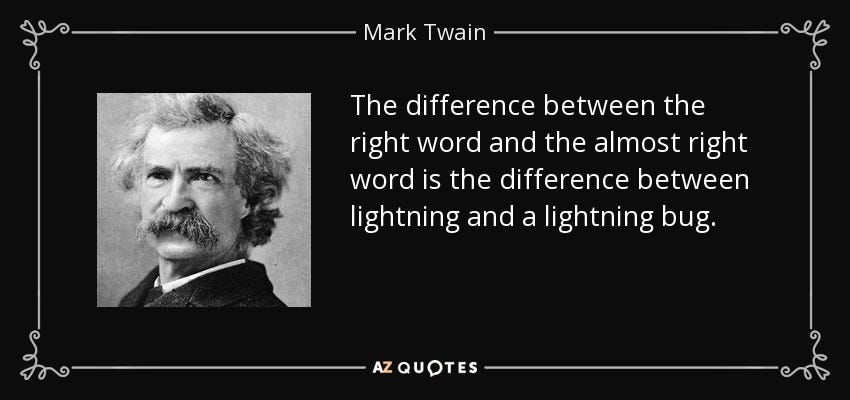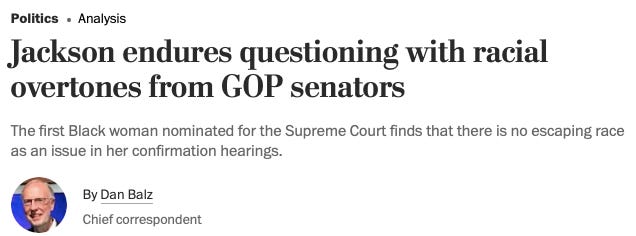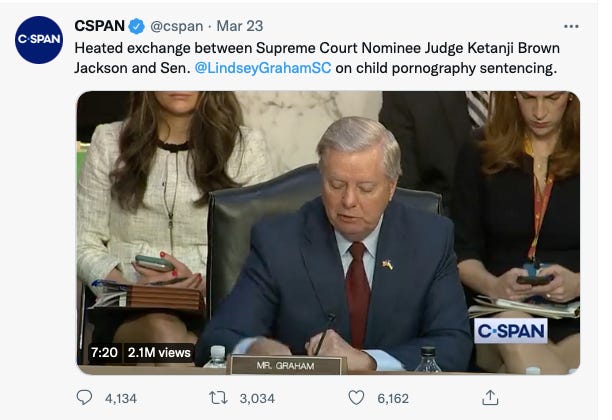Almost Right Words, Right Words, Wrong Words
Lessons from Mark Twain and congressional hearings
I do an exercise with my writing students that I call Right Word v. Almost Right Word.1
At the start I share a quote from Mark Twain:
I ask students to notice the precision of the metaphor. Twain isn’t noting the difference between the right word and the wrong word, but the right word and the almost right word. The difference is significant: a faint glow v. a bolt from the blue.
Next, I read a short passage of prose out loud, asking students to make a notation when they hear language that strikes them, one way or another. One of my favorite passages to read is the David Foster Wallace essay chronicling his time on a Caribbean cruise, “A Supposedly Fun Thing I’ll Never Do Again,” collected in a book of essays of the same title.
The passage contains a number of striking bits of descriptive imagery:
I have felt the full clothy weight of a subtropical sky.
I have jumped a dozen times at the shattering, flatulence-of-the-gods-like sound of the cruise ship’s horn.
I have heard steel drums and eaten conch fritters and watched a woman in silver lame projectile-vomit inside a glass elevator.
There is one line in particular that winds up on just about every student’s notepad:
I have smelled what suntan lotion smells like spread over 21,000 pounds of hot flesh.2
I ask students for their emotional response to that sentence, and their noses wrinkle. They’re grossed out, which is of course the point of the choices David Foster Wallace makes. The entire essay is an exploration of a strain of American consumer excess manifested in the cruise industry where Foster Wallace is often marveling, but rarely admiring.
I next read an alternate version of the same sentence with a single word changed.
I have smelled what suntan lotion smells like spread over 21,000 pounds of hot skin.
The diminished effect is readily apparent. Skin is perfectly fine, the almost right word. For David Foster Wallace’s rhetorical purpose, however, flesh is the right word. It is visceral (literally), and even the sound it makes feels unsettling.
One of my mantras about teaching writing is that I don’t teach grammar, I teach sentences. I don’t want students focused on correctness - unless correctness is called for. I want them considering the audience and occasion and the effect of their choices on the audience.
It’s the quality and nature of those choices that determine the effect of the writer’s prose on their audience. That’s the kind of problem I want students to wrestle with.
For a little bit while working this week, I had the NPR feed of the confirmation hearings for Judge Ketanji Brown Jackson playing in the background3. This led to some teeth gnashing while hearing Ted Cruz, in the words of Washington Post critic, Ron Charles, “give the nation a lesson in misreading kids books.”
(Because no seems to like Ted Cruz4, he primarily succeeded in driving up the sales for The End of Policing by Alex S. Vitale, Antiracist Baby by Ibram X. Kendi and Ashley Lukashevsky.)
I also heard a harangue from my home state senator, Lindsay Graham in which he wanted to re-litigate the treatment of Brett Kavanaugh during Kavanaugh’s confirmation hearing, and engaged in some bad faith attacks some of Judge Brown’s sentencing practices. I could not help but notice the equanimity Judge Brown had to display throughout the proceedings. If anyone doubts the existence of structural racism, imagine if she had thrown a Kavanaugh-like tantrum, and the rash of articles about her “non-judicial temperament” which would surely follow.
I spend a lot of time thinking about rhetoric and choices of language. There really is a significant difference between the almost right word and the right word. There’s also a big difference between the right word and the wrong word.
After listening to some of the hearing, I was struck by the choice of language in some of the news coverage of the goings on, like this from The Washington Post.
In this case, “racial overtones” are the wrong words. “Jackson endures racist questioning from GOP senators” would be far more accurate.
Consider this tweet, also from the Post.
By the end of the semester, even my first-year students know to avoid such passive constructions which eliminate the actor from the scene. How did this race get in to “hover” over the hearing, exactly? Did someone leave a window open?
I also made note of this tweet from CSPAN:
“Heated exchange” implies that two parties are engaged in a mutual back and forth. This is not what happened. Lindsey Graham spewed nonsense invective that Judge Jackson responded to with preternatural equanimity.
I try not to get too worked about this stuff because I would be in a state of perpetual extreme irritation, but on the other hand, maybe we need to be a lot more worked up about this stuff so our leading journalistic institutions do not abuse the language in such egregious ways.
Once this nonsense is over, Jackson will be the first Black female justice on the United States Supreme Court, but looking at the way she has been treated, looking at the way race in America continue to be covered - substituting euphemism for accuracy, studiously avoiding using the right words as some kind of attempt to strike a balance in coverage - it’s hard to see this whole affair as any kind of progress.
One of the hurdles I try to clear with students is to get them to believe that caring about this stuff matters, that at least attempting to describe the world accurately and precisely is meaningful, an ethical responsibility writers hold as part of their writing practices.
But it’s tough to do when you look into the world and see seasoned professionals who have achieved a stature most of us can only dream of, who do not seem invested in these same values.
Links
My Chicago Tribune column this week is about the “blind book date” I went on thanks to Malaprop’s Bookstore in Asheville, NC, where I got hooked up with Alien Virus Love Disaster, a highly entertaining collection of short stories by Abbey Mei Otis.
Thanks to a reader here (Thanks Val!), I was introduced to the Meadowbrook Writer, a 90’s era publication of Meadowbrook School back in my old stomping grounds of Northbrook, IL. This prompted me to publish a piece about why I think we should publish all students’ writing at my other Substack newsletter, Educational Endeavors.
Over at The MarySue, Alyssa Shotwell provides a list of “Books That Explore Complicated, Differing Experiences of Women in U.S. History.”
The fact that publishers do not fact check nonfiction books is a subject I want to talk about in more detail here sometime. The latest disturbing example of this is a book claiming to identify person who informed on the family of Anne Frank has been called into question by expert historians.
The New York Times has 18 new works of fiction to read this Spring, but only 17 works of nonfiction. Get it together nonfiction!
Recommendations
All books linked here are part of The Biblioracle Recommends bookshop at Bookshop.org. Affiliate income for purchases through the bookshop goes to Open Books in Chicago.
We’re up to $66.90 of affiliate income for the year.5
I used all my unfulfilled recommendations in my column this week, so instead, I’m offering a little preview of the books I mention in next week’s Tribune column, all books I recommend.
Born Standing Up by Steve Martin
Comedy Comedy Comedy Drama by Bob Odenkirk
Bossypants by Tina Fey
Yes Please by Amy Poehler
All About Me: My Remarkable Life in Showbiz by Mel Brooks
Waiting for the Punch: Words to Live By from the WTF Podcast by Marc Maron & Brendan McDonald
Paid subscription update
We made it! Thanks to a nice little surge of paid subscriptions, we’ve crested the $12,500 annualized revenue threshold ($13,337!), which means I can start soliciting an additional piece of paid content from outside contributors per month. I’ve already put some wheels into motion for an ongoing feature that I think will be very fun. Stay tuned! The next goal is $15,500, which means I can afford to pay outside contributors (and myself), $250 per post, which is getting into respectable freelance rates by contemporary standards.
The Morning News Tournament of Books is entering its final week and it has been a doozy of a tournament thus far. Catch up with all the action thus far, and prepare for the Zombie Round, when two previously vanquished books come back from the dead to re-enter the competition.
See you next week,
JW
The Biblioracle
The vast majority of my writing pedagogy is available in my book The Writer’s Practice: Building Confidence in Your Nonfiction Writing.
As a maybe interesting aside about choice and language, when the same essay was originally published in Harper’s Magazine under the title, “Shipping Out,” the sentence read, “I have smelled suntan lotion spread over 2100 pounds of hot flesh.” Notice the two significant changes from the book version as DFW wanted it, the removal of the repetition of “smells” and “smells like” and the reduction of 21,000 pounds to 2100 pounds. The first tramples DFW’s voice in the interest of standard grammar. The second substitutes accuracy for hyperbole. Both are bad choices (IMO), and I much prefer DFW’s version.
Former senator Al Franken famously said of Cruz, "Here's the thing you have to understand about Ted Cruz. I like Ted Cruz more than most of my other colleagues like Ted Cruz. And I hate Ted Cruz."
I’ll match affiliate income up to 5% of annualized revenue for the newsletter, or $500, whichever is larger.








Would it surprise you to know that a certain someone else dialed up the rhetoric?
https://twitter.com/neal_katyal/status/1508145997393801216
And you've expressed so well what I've been feeling about the hearings.